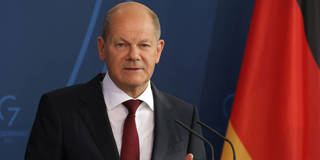Russia’s war in Ukraine has forced Germany to contend with the implications of its longstanding pacifism and emphasis on constructive engagement with the Kremlin. Like the United States, the United Kingdom, and France decades ago, Germany must now decide between a “bad peace” and a “good war.”
BERLIN – A commentary by philosopher Jürgen Habermas has triggered one of Germany’s most ferocious political debates in decades, on the question of how the country should position itself in the widening Russian-Ukrainian war. Chancellor Olaf Scholz has been subject to a barrage of open letters, each signed by hundreds of leading public figures. Some take a hawkish position, advocating more forceful and active engagement on Ukraine’s behalf; others are dovish, pushing for a settlement that would let Russia claim some kind of victory and spare Europe from a widening and prolonged conflict.

BERLIN – A commentary by philosopher Jürgen Habermas has triggered one of Germany’s most ferocious political debates in decades, on the question of how the country should position itself in the widening Russian-Ukrainian war. Chancellor Olaf Scholz has been subject to a barrage of open letters, each signed by hundreds of leading public figures. Some take a hawkish position, advocating more forceful and active engagement on Ukraine’s behalf; others are dovish, pushing for a settlement that would let Russia claim some kind of victory and spare Europe from a widening and prolonged conflict.